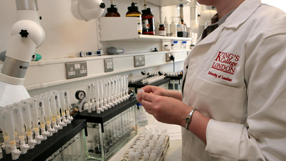Premier League players to face drugs tests
LONDON - Thirty Premier League players are to be placed on a register which will require them to reveal their location for an hour every day during which time they could undergo random drugs tests.

"They will have to register for one hour a day where they are going to be in advance," a UK Sports spokeswoman said on Tuesday.
"They are not going to know how many times they are going to be tested. Because it's a random procedure the number of tests they could be subjected to will be random as well."
At present one player from each team is tested after every match.
The spokeswoman said it had not yet been decided who the footballers would be or what the criteria would be for selecting them. The scheme will be introduced on July 1 next year under the new World Anti-Doping Agency (WADA) code which comes into force from January 1.
"This move, in partnership with the Professional Footballers' Association (PFA), is really getting whereabouts into the professional soccer game, to bring them in line with other athletes and continue the fight against doping across all our sports," UK Sport's chief executive John Steele told BBC radio.
"Anything we can do that furthers that battle is very positive."
England and Manchester United defender Rio Ferdinand was banned for eight months after failing to attend a drugs test at the club's training ground in 2003.
Get FourFourTwo Newsletter
The best features, fun and footballing quizzes, straight to your inbox every week.
Also in 2003, Chelsea sacked goalkeeper Mark Bosnich after he tested positive for cocaine. Another former Chelsea player Adrian Mutu was suspended by the Football Association for seven months in 2004 after failing a drugs test.
Out-of-competition tests were introduced into athletics in 1989, the year after Ben Johnson tested positive for a steroid after winning the Seoul Olympic 100 metres final in world-record time.
Britain's Olympic and world 400 metres champion Christine Ohuruogu was banned for a year in 2006 for missing three out-of-competition tests when she failed to turn up to her stated location.
